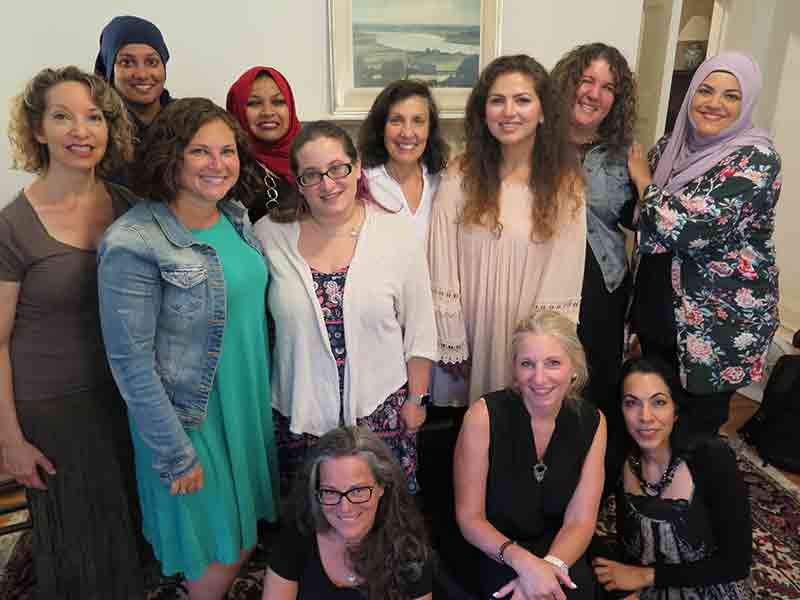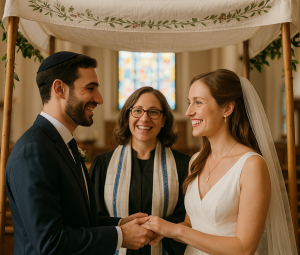Two weeks after the 2016 U.S. presidential election, Cynthia Levine-Rasky, a Toronto sociology professor, was still worrying about the results and what it would mean for women and minorities, when an intriguing post popped up in her Facebook feed. It was a notice about the Sisterhood of Salaam Shalom, an American group dedicated to building bridges between Muslim and Jewish women.
“I realized that was exactly what I was looking for,” she said. “I didn’t want to remain in a place of fear, I wanted to do something.”
She convinced the group to let her start its first Canadian chapter, asked a Muslim woman, doctoral student Sabreena Ghaffar-Siddiqui, to co-lead the group and, six weeks later, the Toronto chapter of the sisterhood held its first meeting.
The sisterhood, which has 46 members (slightly more Muslims than Jews are currently on board), opens its monthly meetings with a Jewish and an Islamic prayer, and then a free-flowing discussion follows, on a topic such as religious experiences, family or childhood.
Ghaffar-Siddiqui says she has two hopes for the sisterhood. “My personal hope is that the individual women who are part of the group may learn a little bit more about the other side, and if they hold any assumptions or misunderstandings, it might help them see the other side in a different light,” she said.
On a larger level, she hopes the women’s experiences have a “ripple effect.
“I hope that we can affect some policy changes and some systemic changes to the discrimination both groups see. And beyond that, not just Jews and Muslims, but for other minorities as well,” she said.
READ: ISLAMOPHOBIA CREATES UNLIKELY ALLIES
Bonds of friendship are already starting to form among the women, who range in age from 23 to 76. Many have joined because, like Levine-Rasky, they were shocked by the vitriolic American election and realized they had a homogenous group of friends and no way to reach out to others.
“This group is the first opportunity I’ve had to interact with religious Muslim women. Now when I walk down the street and see a woman in a hijab, I think, ‘you could be my sister,’ ” said Mitzi Zohar.
“I was looking for an opportunity to have a shared safe space,” said Haniya Sheikh. “It’s opened up a new world for myself and my sisters on the other side.”
In the months since the group started, it has held a women’s seder, sent a letter of protest when a branch of the Toronto Public Library hosted a memorial for a far-right lawyer who had defended Holocaust denier Ernst Zundel and have been a constant source of support for one another.
The sisterhood mixes interfaith dialogue and activism, said Levine-Rasky. “A good deal of what we do is talk,” she said. “It’s a way of making real personal connections across religious groups, so we can get work done that will benefit both our groups.”
In July, after a Muslim teen was murdered on her way to a mosque in the United States and worshippers were attacked in England, Levine-Rasky asked each Jewish woman to call a Muslim woman and offer support.
“I have to be strong for my children, it feels like I’m carrying the weight on my shoulders,” said Tazeen Alam, recalling how she felt after reading about the attacks. “A couple of members reached out to me with empathy and compassion … and it’s now a part of our lives.”
The sisterhood, which started in 2010 in the United States, has captured the attention of women who are yearning to meet like-minded souls. Energized by the election, the sisterhood has grown from 50 to 150 chapters in the United States.
In Canada, there is interest in starting chapters at the University of Toronto, as well as in Markham, Ont., Ottawa and Montreal. Members of the Toronto group say their teenage daughters, a few of whom attended the group’s seder, and who have seen their mothers trooping off to monthly meetings, want to start their own chapter.
“The personal is political. For me, that’s what this group is about,” said Bluma Teram. “With this group and (groups) all over the U.S., it’s a very strong political statement we’re making, as well.”
The Toronto chapter has started building bridges between the two religious groups. Sheikh, who is planning for Islamic Heritage Month in October, says she has incorporated information about the Holocaust and Muslim-Jewish friendships. “When Muslims see a Jewish organization helping, it’s so myth-busting,” she said.
The group has not strayed into the political yet, focusing first on nurturing friendships. “There are so many topics in the Jewish-Muslim world that are so emotionally and politically charged. It can be very difficult to talk about the real world, so people avoid talking about it all,” said Rabbi Emma Gottlieb, a member of the group. “A group like this allows us to first know each other as people, and then later, from a foundation of relationship, we will be able to learn together to have these harder conversations.”
To learn more about the Sisterhood of Salaam Shalom, visit them on Facebook, or email [email protected]







